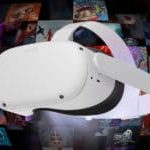It’s PlayStation VR’s 5th birthday, so I’m going to do what we should all try to do on birthdays: say something really nice about it. Something that, as a life-long PlayStation user, I don’t say lightly.
PSVR was the best peripheral Sony’s gaming division has ever made. There, I said it.
Sony’s history with console peripherals and spin-offs has been, let’s face it, a little rocky. For every time PlayStation captured a certain market with a specific concept, there were two or three other attempts that didn’t quite take off. The PS2-era SingStar mics and Buzz controllers found a home in Europe, but the PS3’s Move controllers struggled to truly differentiate themselves in the face of the technically simplified — and much cheaper — Nintendo Wii.
This is true even of its side-projects like the PS Vita. That handheld was, for all intents and purposes, a little miracle of a device, but a lack of software support and the increasing shift towards mobile games really hurt its chances. The general trepidation around launching a VR headset on PS4 was certainly understandable, then.
Five years on, I’d argue PSVR was not only the rare PlayStation peripheral success story (or at least relative success story), but the best side-venture Sony has pursued in PlayStation’s 25+ year history.
That verdict was far from assured. PSVR faced an uphill battle as a $399 add-on for an already expensive console that also required a complicated sprawl of wires for an experience that — at the time — precious few people could attest to. Not to mention that the headset used the already-aged Move controllers and a tracking system that couldn’t keep up with you if turned your back away from a camera. Overall it seemed like a much bigger risk than motion controllers or karaoke microphones.
But PSVR, and VR in general, proved too interesting a prospect for many developers to ignore. The headset had a surprisingly strong launch lineup that let you become Batman, drive a tank, race cars and pilot a spaceship. None of this content resembled the top-end of PlayStation’s usual output, like the impeccably produced Uncharted series or the God of War reboot, but it was a diverse portfolio that really scratched at something not often seen in the gaming market, something genuinely new. Even if a lot of the content coming to PSVR was on the scrappy side, you had to respect the sheer amount of innovation in the scene.
And that’s true of the wider library five years on. There are perhaps only a handful of truly incredible, fully native PSVR games. Astro Bot’s breadth of charming ideas certainly comes to mind, as do the genuinely unique experiences offered in The Walking Dead: Saints & Sinners and Superhot VR. But the platform is in no short supply of good, even great attempts to bring beloved genres, franchises and even entirely different gaming experiences to VR. Iron Man VR’s archnemesis might’ve been limited computing power, but it delivered on its core goal of thrilling superhero combat. Hitman 3 didn’t fully implement motion controls, but sneaking through corridors by physically leaning provided a fresh angle on Agent 47’s adventures. Even if this wasn’t the definitive way to play the game, it was a truly different experience that didn’t feel shoehorned in.
These were games that had developers tapping at the glass ceiling if never smashing right the way through it. But, given just how unwieldy VR development remains even five years on, that’s kind of enough.
But PSVR’s successes can’t be attributed to Sony on its own. Yes, the platform holder was no doubt instrumental to securing giant exclusives like Resident Evil 7 and, more recently, Hitman 3, but a lot of PSVR’s best games have come from developers’ desire to create something previously unseen. In Stockholm, former DICE and King developers gathered for a fresh start with studios like Fast Travel Games. In Seattle, people that once worked on Halo took a chance on Moss and in the process unearthed a unique layer of player/protagonist relationships we hadn’t really seen before.
Artists that hadn’t really made games before like Innerspace created A Fisherman’s Tale, which provided possibly the most mind-bending puzzle experience of the past few years. Even the sci-fi blockbuster action of the PlayStation-published Farpoint was born out of a former Sony developer’s experiments with a gun-shaped controller.
It’s that hunger to break the mold that really sustained PSVR during a time in which bigger publishers were hesitant to commit to the wider medium. And these titles have led the headset to a respectable milestone: 5 million units sold as of January 2020. Now, compared to the many millions of units the PS4 itself has shifted, that’s nothing. But stacked up against the HTC Vive and Oculus Rift headsets it released alongside it’s thought to be the clear winner (the lifetime sales of those two devices was never fully revealed). It’s a modest landmark to say the least but it served as a rare beacon of encouragement until VR headsets could become cheaper, more accessible and ultimately much more viable products.
As the headset has aged, it’s faced tougher challenges. PC VR headsets got better and cheaper, with tracking systems that practically fossilized Sony’s solution, and the sublime simplicity of the Oculus Quest has made it increasingly tougher to stand its ground as we wait for PS5 VR. And yet, somehow, the platform has still had notable releases even in 2021 with Hitman 3, Song in the Smoke and Fracked.
But it is time, though, to look beyond. PSVR has had a great run, better than many had expected it to, in fact. I can’t wait to see Sony bring this level of commitment to a new device on a machine far more capable of delivering complex, visually-rich VR titles and (hopefully) with much better tracking. It’s the story I’m most looking forward to covering in 2022.
But PSVR made plenty of magic with the tools it was given. At a time when VR’s future was far from certain, it proved to be the little headset that could. And I’ll remember every moment of eye-opening immersion, every struggle to get a Move controller to properly calibrate, every terrible VR movie tie-in and every unbridled scream of jump scare terror with immense fondness.






